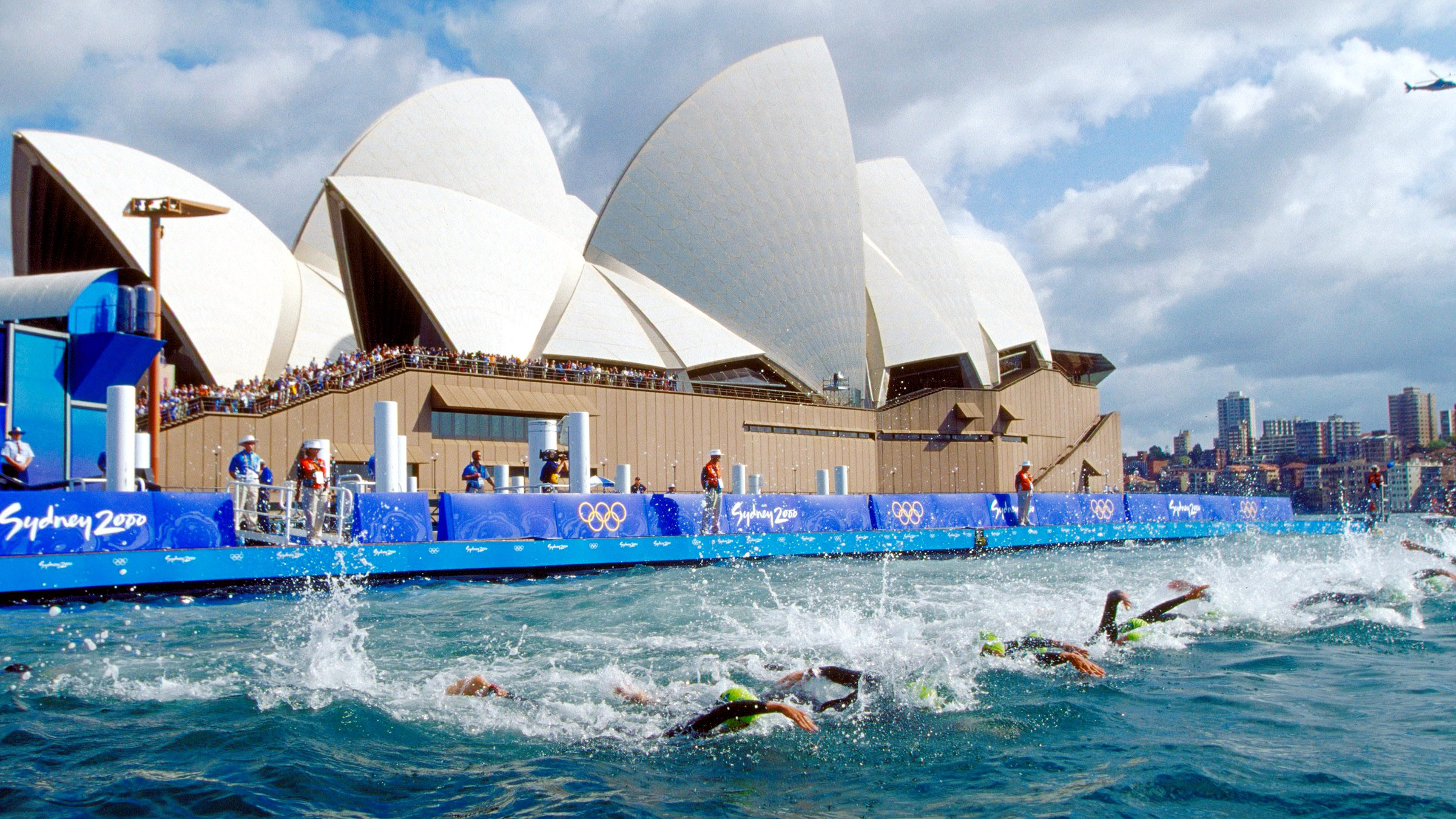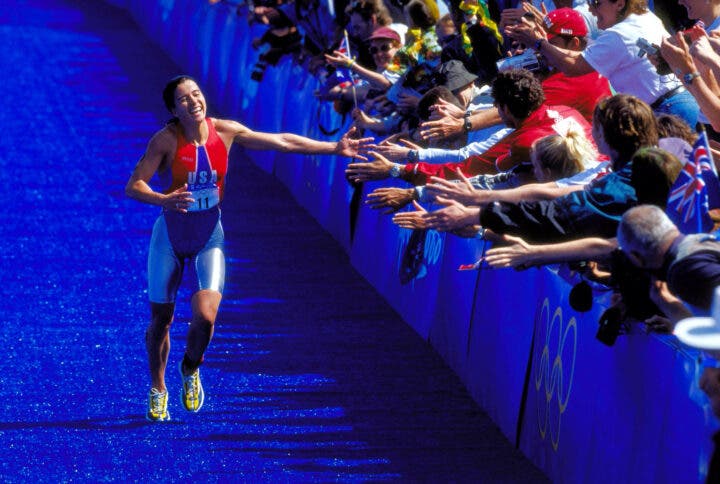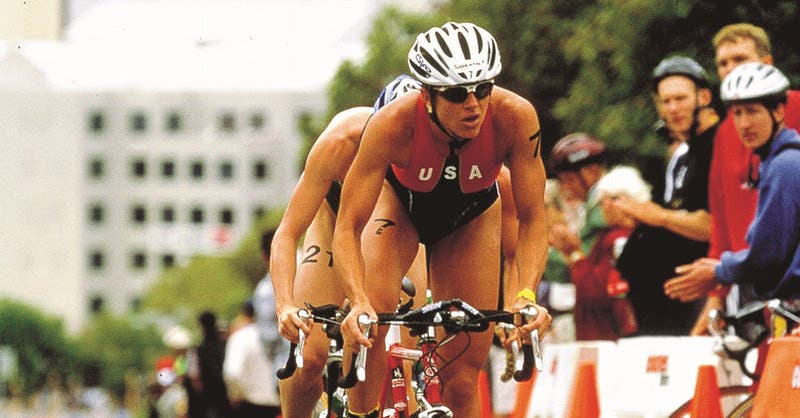How Triathlon’s Addition To The Olympics Impacted Our Sport

Triathlon debuted at the 2000 Olympics, featuring a stunning course based around the Sydney Opera House. (Photo: Jamie Squire/Allsport/Getty Images)
This summer, 110 of the finest triathletes in the world will take on the stunning triathlon course of the 2024 Paris Olympics hoping to etch their name in Olympic history.
24 years ago this September, the world’s best short-course triathletes descended upon Sydney, Australia for the very first Olympic triathlon. With great fanfare, the crowds turned out in droves to watch the inaugural event, taking place in the shadows of the iconic Sydney Opera House where Canada’s Simon Whitfield and Switzerland’s Brigitte McMahon would take gold.
The notable addition of the mixed team relay has added another level of excitement since its inclusion for the first time at the Tokyo Olympics, but largely the event remains the same. Athletes will take on a 1.5km swim, a 40km bike, and a 10 km run to the finish line on the Pont de Alexandre III in Paris.
However, as we approach the seventh Olympiad to include triathlon, it’s worth looking back at how the event has evolved. We asked two of the U.S.’s top athletes of the time, Joanna Zeiger and Barb Lindquist, to reflect on those early days of triathlon in the Olympics, and how the event impacted their professional careers.
Joanna Zeiger, 2000 Olympian for Team USA

A relative unknown on the draft-legal racing scene at the time, Zeiger triumphed at the 2000 Olympic Trials in San Antonio, Texas to seal her spot for Sydney. She finished fourth at the Olympics, then five weeks later, placed fifth at the Ironman World Championships. She went on to have a sparkling career in middle- and long-distance racing, winning the 2008 Ironman 70.3 World Championships before suffering a career-ending injury in 2009.
“I began my career as a middle-distance triathlete and was drawn to the sport with the intention of placing well at the Ironman World Championships in Kona. I did not know that triathlon was being considered as an Olympic sport until about a year before the trials, and I decided I would try to go for it. I had no experience in short-course, draft-legal racing, and it was a lot to learn. But I knew I had potential. Still, things weren’t easy: Once, a competitor took my chain off my bike in transition. Another time, a woman came right up next to me and shouldered me and tried to knock me off my bike. I was a late-comer to the sport, but had success quickly, and I think people resented that. To be honest, draft-legal racing really vexed me: I didn’t like that the outcome of my race was dependent on other people on the bike. But I wanted to give it a shot and see what I could do.
Qualifying for the team was thrilling. I ran really well and was able to get into second place after being in the chase pack on the bike. Running down the homestretch at the Olympic Trials was one of the most incredible moments of my life. I was realizing a dream I never even knew I had.
Being an Olympian is an amazing experience from start to finish: At the Team USA processing in San Diego, they gave you a shopping cart and you just went around this room and they filled it up with Olympic gear. We got so much stuff. There was also a place to get manicures, and you could get your hair done. There was a tailor there who would alter your gear if it didn’t fit. It gives me chills just to think about it.
The setting in Sydney was incredible. I can’t think of a more incredible venue. It was just mind-blowing. On the morning of the race, we were all lined up to start at the Sydney Opera House. I was so nervous. They called us out to the pontoon, they took our positions, my heart was beating so fast, but as soon as the gun went off, I felt totally calm. In Sydney, the crowds really came out. All I wanted to do was look around and take it all in, but I also had to concentrate on the race.
About halfway through the bike, my Team USA teammate Jen Gutierrez came up to me and said, ‘You’re our best chance for a medal.’ I was shocked that she had planned this out in her head without telling me! She put me in the position to have a shot. I had a great bike, and ran as fast as I could to try to get that medal. But in the end, I was fourth. And it was the best I could do.
I honestly don’t think adding triathlon to the Olympics altered the course of the sport as a whole, or helped to elevate the sport. I really wish that it had more impact. In general, people are actually more impressed by the Ironman, and I suppose it will always remain that way. When I say I’m a triathlete, people will say, ‘Oh have you been to Hawaii?’. Being an Olympian for some reason doesn’t carry as much weight, but I’m glad I did it.”
Barb Lindquist, 2004 Olympian and USAT Collegiate Recruitment Program Coordinator

Ranked fifth in the world going into the 2000 Olympic Trials, Lindquist was a heavy favorite to make the Sydney squad. But after a blistering swim and bike, where she and Sheila Taormina amassed a huge lead over the chasers, Lindquist faded on the run, ultimately collapsing and requiring medical attention. Disappointed but undeterred, Lindquist went on to dominate on both the draft-legal and non-drafting scene in the early 2000s, going on to lock in her Olympic spot in 2004, placing ninth in Athens.
After retiring, Lindquist spearheaded the USAT Collegiate Recruitment Program. She has been heralded for discovering 2016 Olympic Gold Medalist Gwen Jorgensen and convincing her to get into triathlon upon her graduation from the University of Wisconsin.
“I didn’t qualify in 2000 after a disappointing finish at the Olympic Trials, and I set my sights on the 2004 games. That kept me going in the sport. In fact, had I made the Olympics in 2000, I may have retired to start a family. Instead, I had some of the best races in my life after those Trials, including winning 13 of 17 races I started.
The Olympics weren’t the reason I got into the sport. I wasn’t one of those kids who was driven by being an Olympian. I just got into the sport to see what I could do in it. I got into triathlon after being an Olympic Trials finalist in swimming, and around 1998, I became the top-ranked American. I was ready to go to Sydney. And when it didn’t happen, I was devastated. I remember being interviewed after the trials with tears streaming down my face and saying, ‘This is not what I want. I want to race in Sydney.’ But I wasn’t done in the sport. I took each year as it went, and had my best racing in the years to follow.
I saw the impact the Olympics had on triathlon in my work as the USAT Collegiate Recruitment Coordinator, especially. Those athletes saw my generation of triathletes going to the Olympics and they believed it could be done, and maybe be done better. I said to Gwen [Jorgensen] at one point early in her career, ‘On paper, you could be a better triathlete than I ever was.’ And it was true. So in some ways, I suppose we paved the way for athletes like Gwen who went on to amazing success.
For me, the Olympics was one of many capstones in my career. To the regular person out there, they see that I’m an Olympian, and that makes an impression. But I was also ranked number one in the world for over a year, and won all of these other races—but the Olympics is definitely what stands out. It’s true what they say, ‘Once an Olympian, always an Olympian, never former, never past.’ No matter what, you’re an Olympian forever. And that’s pretty cool.”
Don’t miss any of the Olympic action in Paris – use our complete streaming guide to watch the individual events on July 30th and 31st, as well as the mixed relay on August 5th.